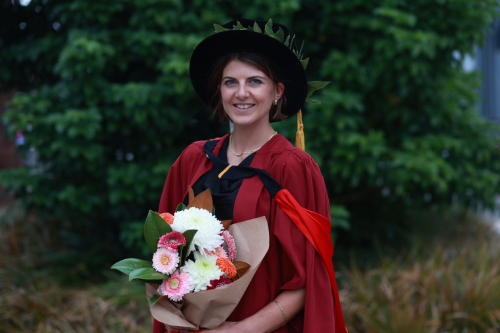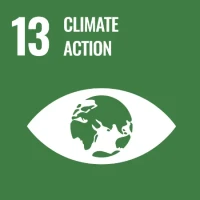Dr Roberta Marcoli is making waves in the aquaculture industry thanks to her University of Waikato degree.

Graduates at the University of Waikato Tauranga campus on Friday.
On Friday, Roberta joined 251 others in graduating from the University’s Tauranga campus, to receive her Doctor of Philosophy (PhD) in Biological Sciences, marking the end of years of hard work and determination.
Throughout the day, students gathered together wearing graduation gowns and korowai and proudly holding their tohu mātauranga (university degrees). Some held bunches of flowers and drinks in hand as they celebrated with friends and family.
As one of the graduation speakers, Roberta emphasised the important role graduates have as leaders of the scientific community.
“I stand here with my heart full of joy and pride to see the next generation of scientists and engineers,” Roberta, 27, said.
“If you are here today, I know that it is because you, with your heart and dedication, support from your whānau and friends and guidance from the staff at Waikato University, you got through it."
University of Waikato Vice-Chancellor Professor Neil Quigley is proud of the students who have come through the doors of the Tauranga campus.
“Since the Tauranga campus opened in 2019, we have welcomed thousands of exceptional and creative students who have gone on to achieve and contribute all over the world in their respective fields.
“To all the graduates this year, and those to come, we encourage you to keep looking towards the future and strive to make a positive impact wherever your journey takes you.”

University of Waikato PhD graduate Roberta Marcoli encourages students to say ‘yes’ to opportunities
Originally from a small fishing village in Italy, Roberta moved to New Zealand in 2017 after meeting her now-husband, Sam Aiken, to start her studies in Tauranga.
At first, she commuted to the Hamilton campus, but once the Tauranga campus opened, she was “the happiest student at the University”.
“Everyone was so welcoming; they were keen to listen, help and cheer for me, even in the hardest parts of my PhD. I never once felt ‘international’.”
As part of her postgraduate degree, Roberta developed a tool to monitor the health of Chinook salmon, a critical effort in the fight to prevent overfishing in the ocean.
This led to her being offered her current role as a postdoctoral researcher at James Cook University in Queensland, studying the molecular and epigenetic changes in barramundi.
Roberta wanted to study at Waikato because of the Coastal Marine Field Station’s reputation for ground-breaking teaching and research conducted in Tauranga Harbour and around the Bay of Plenty.
Chair of Coastal Science at Waikato University, Professor Chris Battershill, said not only has the facility attracted some of the world’s leading experts, it continues to train students and professionals in aquaculture for the future, including new targets to expand our ‘blue’ economy.
“The research we do is unique and leads to unique teaching experiences, such that our students are sought after for jobs when they leave,” Professor Battershill said.
“We specialise in multidisciplinary research and education, and everything we do is enmeshed in mātauranga Māori. This gives us an unprecedented lead which we truly acknowledge”.
The Coastal Marine Field Station offers a unique aquaculture programme and is home to research on the biology, physiology, and ecology of marine species. Undergraduates can take papers in Aquaculture or Environmental Sciences, as part of the Bachelor of Science degree, and postgraduate students can work on research either at the Marine Station in Tauranga or Hamilton campuses.
The University of Waikato held four days of graduation celebrations last week, with a total of 1,504 students graduating across 11 ceremonies in Tauranga and Hamilton.







